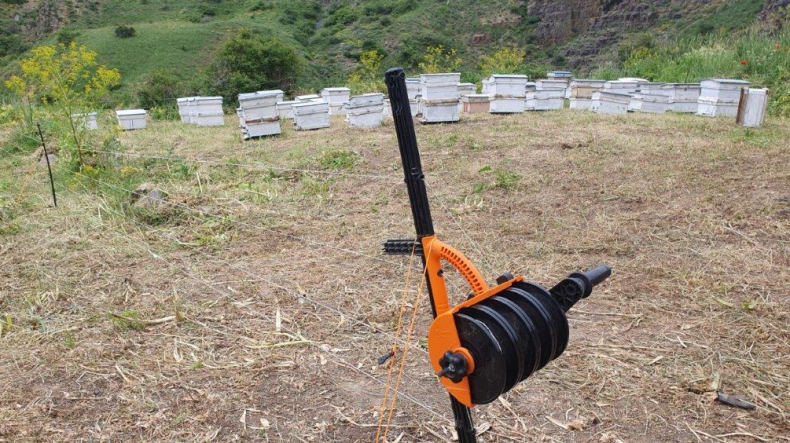
Viva-MTS: Harmless interaction between Electric Fences and bears
The practice of shift night monitoring of the areas of Vayots Dzor has a long history. Invasion of bears have become so commonplace that villages have created improvised means to announce their unexpected visit. But neither detectors fixed on trees nor vigilance are enough to protect farms from bears’ attacks. In the enlarged Yeghegnadzor community, which unites the villages of Getap, Gladzor, Malishka, Vernashen and the city of Yeghegnadzor, after the visit of bears, there are always photos of broken beehives and farmers’ financial losses.
“Two years ago, a bear took away beehives: one beehive from a neighbor, 9 beehives from our bees. We would get at least 170-200 kg of honey from nine bee colonies. The beehives were damaged, we lost the bee colonies. This is a serious damage for the farmer. There is no way to fight back. Obviously, we have no right to harm a bear. We are aware that there are solar-powered electric fences of high efficiency. Our beekeeper neighbors are confident that there is no harm from the electric fences. Now, there is an apiary above our village. Two years ago, when the bear damaged everyone’s beehives, it did not damage those protected by the fences,” said Zhirayr Minasyan, 63 years old, a resident of Vernashen village, who was born in a beekeeper’s family and continues the family business.
Years ago, Viva-MTS and the Foundation for the Preservation of Wildlife and Cultural Assets (FPWC) found the best way to mitigate the human-wildlife conflict. “Electric Fences”, which operate with the use of modern technologies have been added to the daily care of nature. For more than 17 years, partners who have been carrying out important and serious environmental projects in different regions of Armenia, in 2020, implemented the first project of embedding “electric fences” in Vayots Dzor. Farms that have used the solar-powered fence service were not attacked by bears in subsequent years. They managed to harvest without harming the animal. The steps taken have proven that this is a balanced approach to solving the problem, Viva-MTS said in a press release on Thursday.
In Vayots Dzor region this year, new farmers began to benefit from the support of Viva-MTS and the Foundation for the Preservation of Wildlife and Cultural Assets (FPWC). In the almost alpine zone, where nature has created wonderful conditions for collecting abundant nectar, dozens of beehives have been entrusted to the "care" of "electric fences." “Electric fences” are especially suitable for beekeepers who are constantly on the move throughout the year and farmers travelling to far-flung pastures. Donated systems have an advantage: they are easily transported, provide local work, allow to enclose the required territory within 10-15 minutes and are dismantled in a short period of time. With the systems provided in 2020, the farmers can enclose 7,500 square meters, and with this year’s systems - 1 hectare (ha) of area.
An electric fence operates at high voltage but low current (amperage). As a result, the animals are not physically harmed, but, feeling unpleasant, they no longer approach the fenced areas. The system consists of a solar panel, a micro-inverter, a battery, an electronic fence generator, and an easy-to-mount and dismantle fence. The system provided four years ago has the possibility of fencing 300 linear meters, and this year - 400 linear meters.
Related news
- Viva-MTS’ digital B2B services show steady growth
- Viva-MTS expands and strengthens entire mobile infrastructure along with 5G network development
- Viva-MTS: Partnership for environmental protection and community development
- Regional Call Center of Viva-MTS opens in Vanadzor
- UNLIM: Viva-MTS launches new prepaid tariff plan
- Border village Berdavan almost completely illuminated – Viva-MTS
- Solar energy and modern technologies in environmental projects – Viva-MTS
- Viva-MTS: Pokr Vedi will save around 1 million drams a year
- Introduction of electric fences program implemented in Ararat – Viva-MTS
- Viva-MTS helps improve family's quality of life in border village
Newsfeed
Videos






























